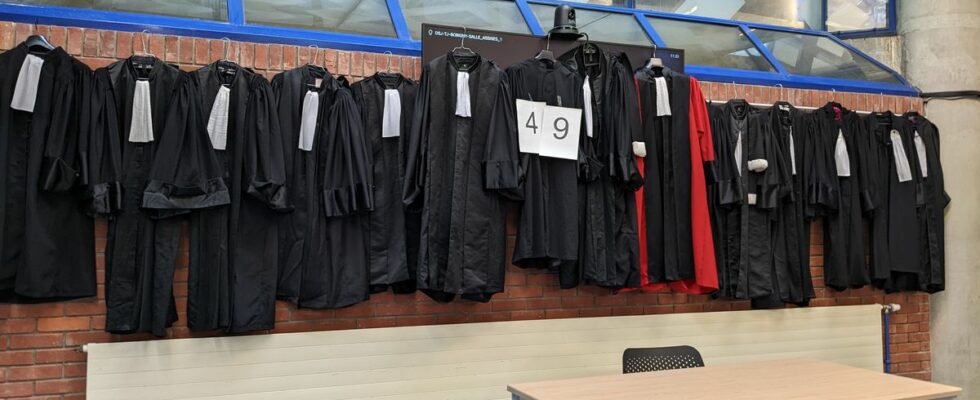Barely passed the doors of the large court of assizes of the judicial court of Bobigny, in Seine-Saint-Denis, we see only them, these black and red dresses floating along the wall. There are 49 of them, symbolizing the number of magistrates that would be needed in addition to “run” the second jurisdiction of France. But a year after the publication of a column in the World pointing out the suffering at work of this usually silent body, and while this Tuesday was a new day of mobilization, all the professionals are unanimous: nothing has changed. Or rather if: the situation has deteriorated further.
“We are as many as last year – 140 -, but new reforms have come into force, which leads to an increase in work with a constant workforce”, begins Maximin Sanson, vice-president of the Bobigny court and delegate of the Union of magistrates. Since this year, the judge of freedoms and detention must for example monitor that the measures of confinement in psychiatric hospitals are legal. The reform of juvenile justice, it clogs up the largest juvenile court in France. “The text came into force a year ago, and we are already having trouble meeting the deadlines”, insists the children’s judge Myrtis Vinas-Roudieres, delegate of the magistrates’ union.
A hearing delay that flies away
From anecdote to anecdote, magistrates, clerks and lawyers recount, for almost two hours, this breathless justice. And in Bobigny, certain figures make you dizzy. 162 financial litigation files – the oldest of which dates from 2017 – are awaiting hearing, that is to say that no date has yet been found to judge them. A drop of water compared to the 517 cases for which the judicial information has been completed and which are also awaiting a hearing before a specialized correctional chamber. “As all the services are overwhelmed, some long-term narcotics cases, even armed robberies, end up in immediate appearance hearings, sighs Sonia Lumbroso, president of a correctional chamber. These are ultra-complex issues that require serious consideration. How do you expect them to be judged like a stolen cell phone? »
Despite her 38 years of experience, the magistrate says she feels on the verge of burnout. Not so much because of the extended hours – that, she got used to it over time – but because of this permanent feeling of dissatisfaction. “As president of the court, I am always in a double case of conscience. Should I force my colleagues to finish at the end of the night, or should I dismiss the litigants and make them wait? Because she knows it, after months, years of waiting, some complainants will never really be recognized as victims: they end up moving, their summonses are lost, thus preventing them from telling their stories. Next week, for example, a gang rape will take place without the victim, a minor at the time of the events, because we now do not know where she lives.
“The problem is that some things take time”
They are many, like her, to evoke this feeling of doing assembly line work. In the juvenile court, educational assistance hearings last an average of 45 minutes, during which each child must be heard, then the parents, the educators, and sometimes the lawyers. “The problem is that some things take time. We have to establish a relationship of trust, but that’s impossible if we have our eyes glued to our watch,” explains Myrtis Vinas-Roudieres. The same confides to being often obliged to cut parents or children who poured out a little too long. “As we are just in time, if we exceed too much, we fall behind on everything. “Starting with the drafting of the judgments which allow the establishment of educational assistance: it still has files dating from September in stock.
All the professionals say it: the recruitment of 1,500 additional magistrates and clerks by the end of the five-year term promised by the ministry will not make it possible to catch up. Especially when it is dizzying. Maximin Sanson is at the head of a chamber reserved for bodily injury, in particular for victims of medical errors or road accidents. “When this chamber was created in 2017, we already had a year of overdue judgment writing. Today, if we don’t take on more business, we’ll have ten years of writing. In two years, it will be fifteen. It is for this reason that many professionals have given up going on strike. “We are so late that sending the files back again was not tenable”, breathes a judge. The hour of mobilization, moreover, had been chosen accordingly: during the lunch break.

